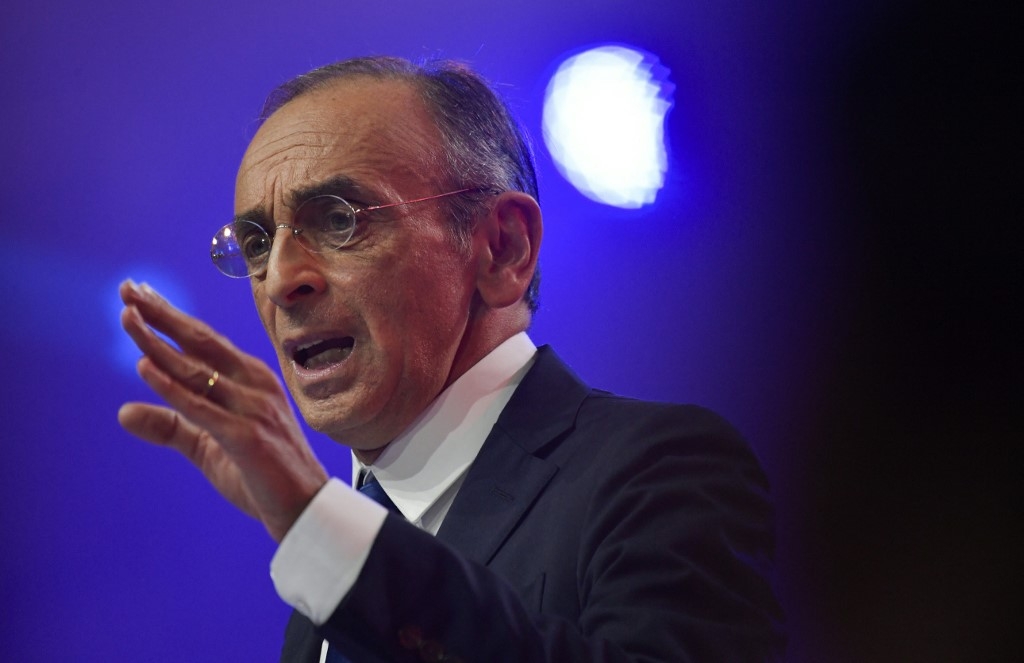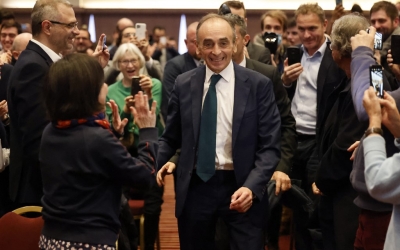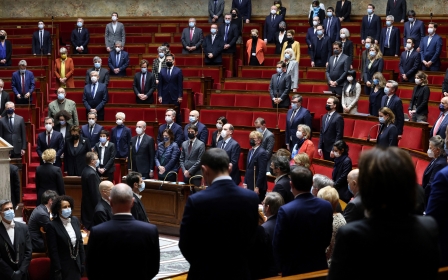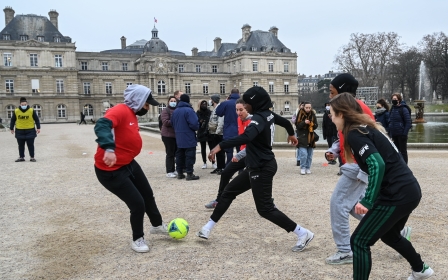France elections 2022: Who is voting for far-right polemicist Eric Zemmour?

Alban decided months ago that he would vote for far-right polemicist Eric Zemmour in France’s April presidential elections.
"It will be the first time I will go and vote with enthusiasm," he told Middle East Eye, grinning.
But the 25-year-old student, who declined to give his surname and has not joined Zemmour's party, tends to keep it to himself.
“It could have a very negative impact on my professional career," he said, sitting in a Paris cafe near the company where he’s interning. "I can defend my ideas in private with my friends, but expressing my political convictions in public is complicated."
When Alban, who comes from a middle-class family, talks about the candidate, he uses a nickname: "Le Z".
“It's more discreet than Zemmour," he says.
Alban is guarded because Zemmour, a 63-year-old descendent of Algerian Berber Jewish immigrants who made his name as a polemicist on rightwing talk shows, is a deeply divisive presidential candidate.
He has been compared to Jean-Marie Le Pen, the father of his far-right rival Marine Le Pen, who has tried to somewhat distance herself from her dad's views.
Le Pen senior and Zemmour both have falsely claimed that Vichy France protected French Jews, for example.
And courts have condemned both several times for racism.
In January, Zemmour was fined €10,000 for racist hate speech during a television show where he described child migrants arriving in France as “thieves, killers” and “rapists”.
'Islamisation of France'
The far-right candidate has built his political offering on the threat of the "great replacement", a conspiracy theory that white French people are being usurped by foreigners, mainly from North and sub-Saharan Africa.
During his first big rally, in December 2021, Zemmour said he was ready to reply to two "fears" that "haunt the French": the “decline” of the nation and the so-called “Islamisation of France".
France doesn’t formally keep ethnicity or religion statistics, a hangover from the Second World War when the Vichy regime rounded up and deported Jews.
Estimates say that of France's 67 million or so inhabitants, three to four million are Muslim.
'The most popular slogan at Eric Zemmour's rallies is taken from Jean-Marie Le Pen's Front National: "We're in our house, we're in our house"'
- Jean-Yves Camus, far-right expert
Nonetheless, Zemmour's message seems to be resonating in a country where Muslims have for years been the subject of discrimination and racism.
Last year, in a poll for Le Monde, two-thirds of respondents agreed that “Islam is a danger for France and the Republic”.
Zemmour is currently polling at around 14 percent.
France has two rounds of voting in presidential elections. The two most popular candidates make it to the decider.
On his current score, Zemmour will not make it to the second round, but this is just the beginning of his political career. His political party, "Reconquete" (or Reconquest), created less than a year ago, already has 85,000 members.
“What you have to understand is that Reconquete is a party with no entry requirements, so anyone can join in," Jean-Yves Camus, a expert on the far right, told MEE.
"You have people who come from the traditional rightwing and who join Zemmour because, for them, he is the only one who fights against the 'great replacement'."
These people, who voted for the right-wing Les Republicains party in 2017, "have become radicalised and believe that Zemmour is their saviour”, Camus added.
Then there are the former voters of Rassemblement National, Marine Le Pen’s party formerly known as the National Front.
After falling short in the last two presidential elections, some of them now believe Le Pen - who is roughly level with her rival in the polls - will never be elected, and have turned to Zemmour.
"The most popular slogan at Eric Zemmour's rallies is taken from Jean-Marie Le Pen's Front National in the 1990s," said Camus. "'We're in our house, we're in our house!'"
'Foreign' scapegoats
Nicolas, who is around 30-years-old, also asked to be anonymous when talking about his support for Zemmour.
Speaking over the phone, he described Zemmour as the "heir" of a country where young people "are bound to be downgraded from the life their parents offered them”.
In the vast hall at Zemmour's recent Lille rally, thousands of people waved blue, white, and red flags, chanting "Zemmour president".
The main theme of his speech was spending power, a major concern of the French population going into the election. Zemmour's fans have their scapegoats. “We have to stop paying medical fees to foreigners," a pensioner in the crowd told MEE.
"I have nothing against foreigners, but when I see how difficult it is for us, we must be given priority," a woman from Lille, an executive in the private sector, said.
"It is more complicated to defend right-wing ideas in this country than left-wing ideas," said Alban, the student. "Today we are at a crossroads in our country. France - like my parents, my grandparents knew - is in danger, and a man like Zemmour can save us".
Middle East Eye delivers independent and unrivalled coverage and analysis of the Middle East, North Africa and beyond. To learn more about republishing this content and the associated fees, please fill out this form. More about MEE can be found here.





